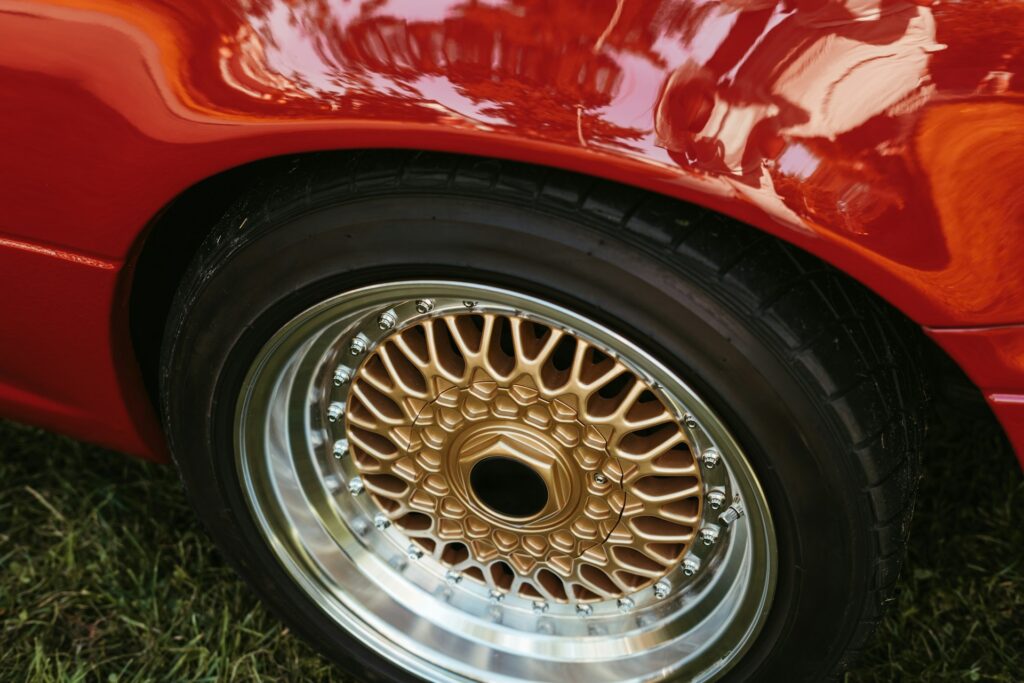We’ve all seen them gleaming on the forecourt – those eye-catching alloy wheels that seem to transform even the most modest hatchback into something rather special.
From the sleek car alloys on a new Audi A3 to the chunky rims adorning a Land Rover Discovery, these metallic marvels have become increasingly common across all vehicle segments. But whilst their aesthetic appeal is undeniable, there’s far more to these wheels than meets the eye. Let’s explore the genuine advantages that make alloy wheels worth considering beyond their kerb appeal.
The Weight Of The Matter
Perhaps the most significant benefit of alloy wheels lies in what they don’t have: excess weight. Typically manufactured from aluminium or magnesium alloys, these wheels can be substantially lighter than their steel counterparts. Research published in engineering journals indicates that optimised alloy wheel designs can achieve weight reductions of nearly 58% without compromising safety parameters.
This reduction in what engineers call ‘unsprung mass’ – the weight not supported by the car’s suspension – has a remarkable domino effect on your vehicle’s performance. Lighter wheels mean your suspension can respond more quickly to road imperfections, delivering a smoother, more controlled ride. It’s the difference between wearing hiking boots and trainers on a long walk – the lighter footwear simply makes everything easier.
Performance That Goes Beyond Looks
The weight savings translate directly into improved acceleration and braking performance. With less rotational mass to overcome, your engine doesn’t have to work as hard to get the wheels spinning, whilst your brakes face an easier task bringing them to a stop. It’s physics at its most practical – and you’ll feel the difference every time you press the pedal.
Moreover, the superior heat conduction properties of aluminium alloy wheels help dissipate the tremendous heat generated during braking. Brake fade occurs when excessive heat builds up in the braking system, reducing effectiveness. Car alloys, with their better thermal conductivity and often more open spoke designs, promote improved airflow and heat dissipation, reducing the risk of brake fade during demanding driving conditions.



Fuel Economy: The Hidden Savings
In an era of rising fuel costs and environmental consciousness, the efficiency gains from alloy wheels shouldn’t be overlooked. The reduced weight means your engine burns less fuel to maintain speed, particularly noticeable during stop-start city driving where you’re constantly accelerating from rest.
Discussions examining fuel efficiency improvements suggest that lighter wheels can provide approximately 1-2% improvement in fuel economy, with some research indicating gains of 2-5% under certain conditions. Whilst these savings might seem modest, they add up over the thousands of miles you’ll cover during ownership. For company car drivers or those with lengthy commutes, this can translate into meaningful savings at the pump.
Precision Engineering Benefits
The manufacturing process for alloy wheels allows for more precise construction than traditional steel wheels. Academic research from engineering departments confirms that this accuracy means better wheel balance and reduced vibration, contributing to a more refined driving experience and potentially extending the life of suspension components and tyres.
Additionally, the design flexibility of alloys allows manufacturers to optimise spoke patterns for improved brake cooling or aerodynamic efficiency – benefits that would be impossible to achieve with pressed steel wheels. The intricate designs possible with car alloys aren’t just for show; they can actively contribute to better thermal management and vehicle dynamics.


The Durability Debate
Whilst steel wheels have a reputation for ruggedness, quality alloy wheels offer their own durability advantages. As noted in automotive engineering literature, aluminium alloys are renowned for their ability to withstand corrosion and rust, maintaining their structural integrity even after years of exposure to British weather and winter road salt.
However, it’s worth noting that alloys can be more susceptible to cosmetic damage from kerb strikes, and repairs can be costlier than simply hammering out a dented steel wheel. It’s a trade-off that requires an honest assessment of your parking prowess!
The Investment Perspective
Quality alloy wheels can enhance your vehicle’s resale value, particularly on performance or premium models where they’re expected as standard. Even on more modest cars, a well-maintained set of alloys signals to potential buyers that the vehicle has been cared for and potentially upgraded. If you’re looking to upgrade your wheels, you can shop the latest car alloys from Elite Wheels & Tyres to find the perfect set for your vehicle.


Making the Right Choice
If you’re considering aftermarket alloys, ensure they’re appropriate for your vehicle’s specifications. The wrong offset or load rating can adversely affect handling and even safety. For instance, the requirements for sporty Audi alloys will differ significantly from those suitable for a Range Rover Sport or a Nissan Qashqai car alloys.
According to Wikipedia’s comprehensive overview, it’s crucial to stick to reputable suppliers and ensure any aftermarket wheels meet appropriate safety standards. Don’t be tempted by suspiciously cheap offerings – in the wheel world, you genuinely get what you pay for.
The Bottom Line
Whilst the visual transformation alloy wheels provide is often the initial attraction, their practical benefits make them far more than a cosmetic upgrade. From improved performance and efficiency to better heat management and potential resale value, they represent a genuine enhancement to your driving experience.
So the next time you admire a set of gleaming car alloys, remember that beneath that polished surface lies solid engineering that delivers tangible benefits every single mile you drive. They’re not just about looking good – though we must admit, that’s a rather nice bonus.





